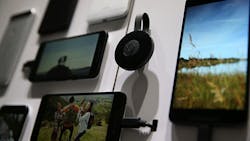Google Counters Apple with Nexus Phones, New Tablet
SAN FRANCISCO — Google fired back at Apple on Tuesday with a pair of new smartphones, a “convertible” tablet and other gadgetry ahead of the year-end holiday shopping season.
The California tech giant unveiled two new Nexus smartphones with enhanced features, including fingerprint sensors and improved cameras, aimed at the high end of the market dominated by Apple and Samsung.
Google said it was partnering with South Korea’s LG for its 5.2-inch screen Nexus 5X, and with China’s Huawei for its “phablet” sized 5.7-inch Nexus 6P.
Both handsets will be sold unlocked, with Google hoping to capitalize on a trend away from smartphone subsidies as part of long-term contracts.
“We care about making sure there are affordable, high quality smartphones for users around the world,” said Sundar Pichai, the Google product chief who is slated to head the company’s largest unit under a reorganization announced earlier this year.
The phones, which aim to showcase the Google Android operating system, were available for ordering in the United States, Great Britain, Japan and Ireland, with more countries to be added next week, Google said as it unveiled the phones at a San Francisco media event.
The Nexus 5X starts at $379 for U.S. customers and the 6P starts at $499.
Powered by Marshmallow (Not Stay-Puft)
The devices will feature the new Android operating system known as Marshmallow, which allows for fingerprint sensors for unlocking and other features including Android Pay.
The phones are priced below the premium devices from Apple such as the new iPhone 6S and 6S Plus, and similar offerings from Samsung.
With the Nexus-branded devices, Google is able to control much of the hardware and software in a manner similar to Apple, which has its own operating system.
“We try to push the next generation of computing forward,” Pichai said of Google making its own branded devices. “To do that, we build hardware.”
The new software allows for a voice-commanded Now On Tap virtual assistant to be summoned by holding down the home screen button.
Google makes Android mobile software available free to device makers, but makes its Nexus line to showcase capabilities of the operating system.
While Android is used on some 80% of smartphones worldwide, many devices use older versions of the software with carriers often slow to release upgrades.
A Convertible Tablet
The Pixel C is the first tablet built ground-up by Google and is seen as an alternative to the new iPad Pro and Microsoft’s Surface. The “C” in the name stands for “convertible” because it features an optional keyboard that doubles as a cover and connects magnetically for laptop-computer style use.
“We think the Pixel C tablet and keyboard experience really unlocks ways to play and be productive across one device,” Google’s Andrew Bowers said while showing off the new hardware. It will be available in time for the year-end holidays at a starting price of $499, with the keyboard priced at $149, according to Google.
Google also unveiled an upgraded version of its popular Chromecast device that plugs into television screens to stream content wirelessly from the Internet, with smartphones or tablets serving as controls.
The company also introduced Chromecast Audio, a pendant-sized device designed to plug into stereo speakers for streaming music, podcasts, YouTube or other audio content through home sound systems.
“Now you have a simple way to amplify your experience to the biggest devices in the home,” said Rishi Chandra of the Chromecast team. Chandra also announced that the Spotify mobile app will work with Chromecast Audio, which avoids Bluetooth connectivity hiccups.
Chromecast Audio promised to provide a low-cost way for people to outfit homes with Internet “smart” stereo systems, according to Gartner analyst Brian Blau. “It is an interesting play on having your music anywhere you want,” Blau said.
Both new Chromecast devices kept the $35 price of the earlier version.
Gartner analyst Werner Goertz saw the new Google offerings as aimed mostly at the consumer market, and playing catch-up with devices launched by rivals.
“The major innovation was around the Pixel,” Goertz said after the presentation. “Everything else was pretty much catch-up. I was hoping for a little more disruption.”
by Glenn Chapman
Copyright Agence France-Presse, 2015
About the Author
Agence France-Presse
Copyright Agence France-Presse, 2002-2025. AFP text, photos, graphics and logos shall not be reproduced, published, broadcast, rewritten for broadcast or publication or redistributed directly or indirectly in any medium. AFP shall not be held liable for any delays, inaccuracies, errors or omissions in any AFP content, or for any actions taken in consequence.
